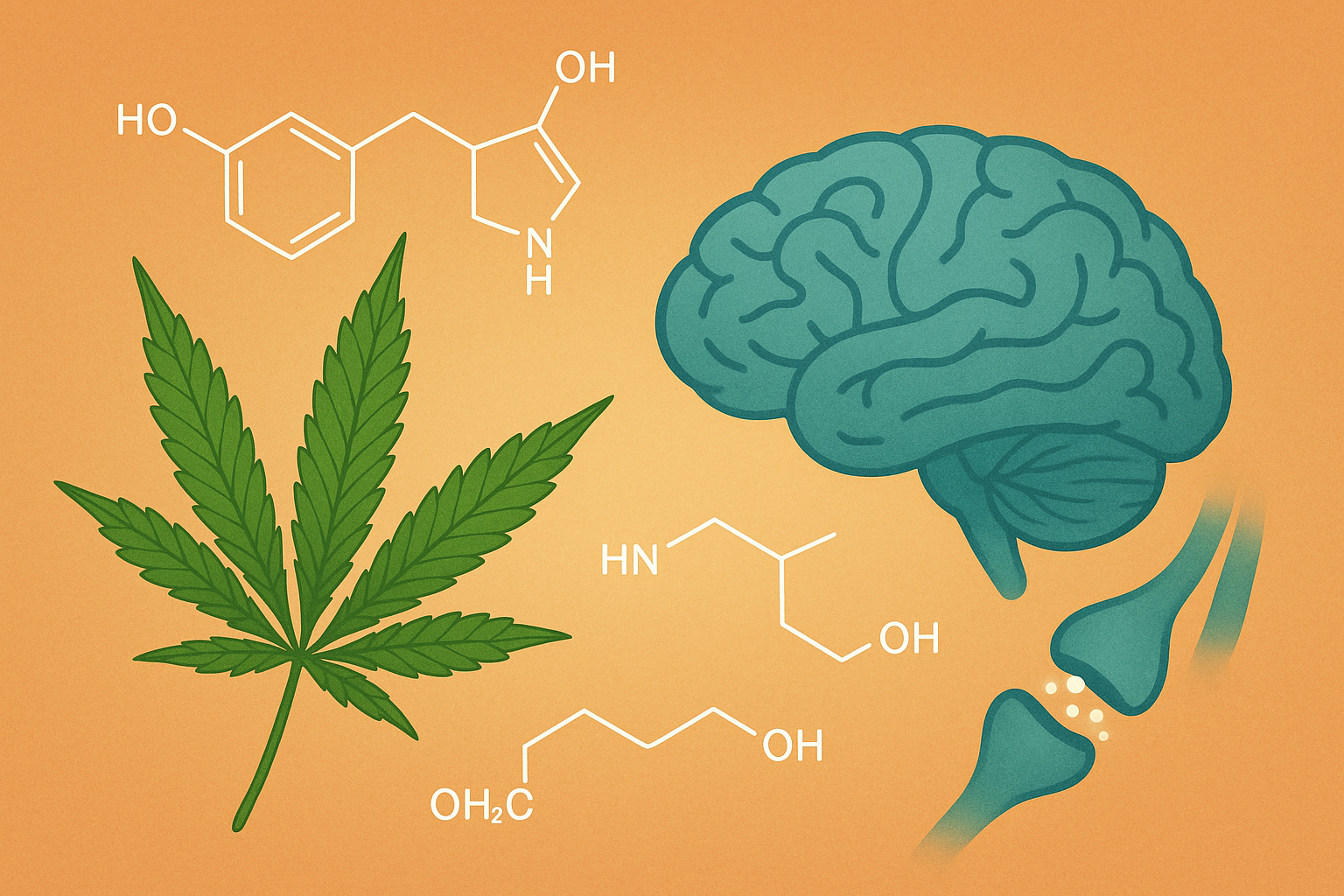Cannabis has long been used for years for medicinal and recreational purposes. But modern science is finding out the way it affects the body. Researchers are determining that compounds in it interact with neurotransmitters in the brain. They influence mood and pain. They also affect sleep and health. Understanding this interaction helps people see the way it can contribute to healing and improved health.
Brain and the Neurotransmitters
Neurotransmitters can carry signals between neurons in the brain. They control many processes, like:
- Mood
- Memory
- Appetite
- Sleep
- Pain perception
Some of the key neurotransmitters are
- Serotonin
- GABA or Gamma-aminobutyric acid
- Endocannabinoids
- Dopamine
Both your brain and body function smoothly when neurotransmitters are balanced. Imbalances can lead to bad conditions like:
- Anxiety
- Depression
- Chronic pain
- Disturbance in sleep
Cannabis mainly contains cannabinoids. It includes:
- THC or tetrahydrocannabinol and
- CBD or cannabidiol.
These can influence the neurotransmitters. They can also help restore balance.
Interaction of Cannabis Compounds with the Brain
The human brain has an ECS. This is a network of receptors and cannabinoids. This system helps regulate mood and pain. It also affects appetite and immune response. Cannabinoids bind to ECS receptors (mainly CB1 and CB2). They affect neurotransmitter activity.
THC binds to CB1 receptors in the brain. This interaction affects the dopamine and serotonin levels.
- This can enhance mood.
- It can reduce pain perception.
- It can even stimulate appetite.
- THC can provide therapeutic benefits (in controlled doses).
- It is also responsible for the psychoactive effects of cannabis.
On the other hand, CBD interacts more indirectly with receptors. It modulates the effects of THC. It influences GABA and other neurotransmitters. CBD does not cause intoxication. But it supports anxiety relief and anti-inflammatory effects. Also, it supports better sleep patterns.
Cannabis compounds interact with neurotransmitters to influence physical and mental health. They create healing opportunities that were not fully understood until recent research.
Cannabis and Pain Management
Normal medications are not always effective in Chronic pain. It affects many people. But to alter pain signals present in the brain, cannabinoids work with neurotransmitters. THC interacts with CB1 receptors. This helps in reducing pain perception. It can also trigger dopamine release. This creates a sense of relief. It also creates comfort.
CBD works to reduce inflammation. It helps to modulate the immune system. These are key contributors to chronic pain.
THC and CBD are effective in pain relief. But for this, they are in specific ratios. This synergy demonstrates the way plant compounds can work with the brain’s chemical system to improve health outcomes.
Sleep and Relaxation
Many people struggle with sleep disorders. Cannabis can help regulate sleep. It does so through its interaction with neurotransmitters. THC has sedative effects. It can reduce the time it takes to fall asleep. CBD is not directly a sedative. But it can reduce anxiety and pain that might otherwise disturb sleep.
Cannabinoids influence GABA. This is a neurotransmitter that promotes relaxation. It reduces overactivity in the brain. Cannabis supports GABA function. This can help the body for restful sleep. This makes cannabis a natural alternative for insomnia. It is also the best option for people facing problems like disrupted sleep patterns.
Mental Health and Mood
Cannabis also influences neurotransmitters related to mood and anxiety. Serotonin and dopamine maintain the health of the mind. Cannabinoids can help regulate these chemicals.
CBD can reduce anxiety. It interacts with serotonin receptors, which are similar to some antidepressant medications. It calms the mind without causing intoxication.
THC can improve mood and create euphoria. But this is possible when it is taken in controlled doses. High amounts may increase anxiety in some people.
By supporting neurotransmitter balance, cannabis can be a useful tool for mental health. It can help in giving relief from anxiety. In some individuals, it can also help in reducing mild depression. This effect, combined with other lifestyle strategies like exercise and therapy, can improve well-being.
Inflammation and Healing
Cannabis compounds reduce inflammation. This way, it can influence overall body health. Inflammation is linked to many chronic diseases. Some of these are:
- Arthritis
- autoimmune disorders
- cardiovascular problems
CBD is particularly effective at modulating immune response. It also helps in lowering inflammation.
Through the ECS and neurotransmitter pathways, cannabinoids can signal the body to reduce inflammation. It also provides a signal to promote body healing. This makes cannabis a promising adjunct therapy for conditions where chronic inflammation is a problem.
Personalized Healing with Cannabis
Cannabis therapy has the potential for personalized treatment. In this, the combination of different strains and cannabinoids can target a particular neurotransmitter to address the needs of an individual.
- A balanced ratio of THC: CBD can provide pain relief. It does not have significant psychoactive effects.
- A strain high in CBD may be best for anxiety and inflammation.
- Specific terpene profiles may further affect mood and relaxation.
Connect with professionals as they understand this therapy in a better way. They can help determine the right compounds and dosages, and delivery methods for safe use.
Future of Cannabis and Neurotransmitter Research
Scientific research continues to find ways of cannabis’ interaction with neurotransmitters. Studies are checking its potential for neurodegenerative diseases. The relationship between cannabinoids and neurotransmitters suggests that it may have broader applications in medicine.
Now, better strategies are developed that improve their healing potential while minimising risks. Cannabis is a promising choice for people looking for natural alternatives.
Accessing Cannabis Safely Through Medical Marijuana Cards
For many people who want to use cannabis for health and healing, the first step is getting a medical marijuana card.
This card is issued by licensed healthcare providers after a simple consultation. A doctor will check your medical history. They will discuss your health concerns. They will see if you qualify based on state guidelines. Once approved, the card lets you buy cannabis legally from trusted dispensaries. These clinics make sure that what you receive is safe and tested.
Having a medical card also means you can get professional advice on how to use cannabis correctly. Doctors can recommend the right strains and the best dosage. They can also tell about the most suitable form, like capsules or oils. This guidance helps patients avoid misuse. It makes treatment more effective.
You may be struggling with chronic pain and anxiety. Some of you may be facing depression and sleep problems. In all such cases, a medical marijuana card provides structure and confidence in using cannabis as part of a wellness plan. It also gives protection under state laws. This makes the process secure and worry-free. In this way, medical cards act as a bridge between safe access and everyday healing with cannabis.
Conclusion
Cannabis improves both physical and mental health of an individual. People can use them more effectively for healing. They can also use it to reduce pain and improve sleep. We have discussed just some of the areas where cannabis can make a difference. With ongoing research and careful use, cannabis has the potential to change the way in which we approach natural healing.
Have questions about Cannabis extraction? Talk to our experts today.





